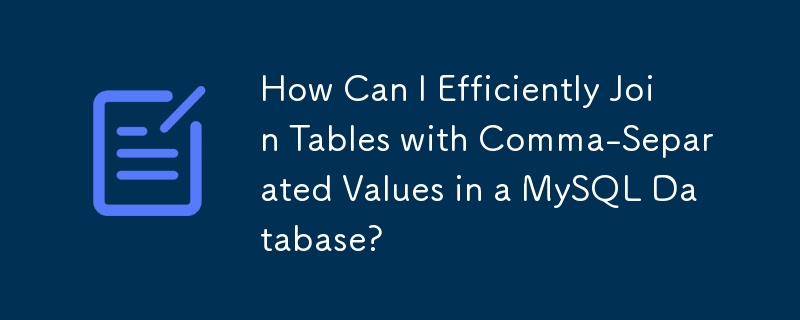

Join Tables with Comma-Separated Values in One Column
When dealing with databases, it's often necessary to join tables based on columns containing comma-separated values. In this specific case, you are trying to retrieve usernames where a comma-separated column in table C ("userids") matches a specific search term.
SQL Query Using Substring Extraction
Your initial query attempted to use a subquery to extract the first value from the comma-separated string in table C's "userids" column. However, this approach is inefficient and unreliable since it assumes that the desired value is always the first in the string.
Improved Query Using find_in_set
A better solution involves using MySQL's find_in_set function, which allows you to search for a specific value within a comma-separated string:
SELECT * FROM tblC c JOIN tblB b ON (find_in_set(b.userid, c.userids) > 0) WHERE c.nname = "new1"
This query will efficiently retrieve all usernames that are associated with the rows in table C where the "nname" column matches "new1."
Normalized Schema Alternative
However, it's important to note that storing comma-separated values in a column is not a recommended practice. For better data integrity and performance, it's preferable to normalize the schema by introducing a junction table.
In the provided example, you can create a new junction table (tblC_user) with two columns: c_id (foreign key to table C) and userid (foreign key to table B). This will allow you to represent the many-to-many relationship between tables C and B without the need for comma-separated strings.
Normalized Query
Using the normalized schema, you can use the following query to retrieve the desired results:
SELECT * FROM tblC c JOIN tblC_user cu ON (c.id = cu.c_id) JOIN tblB b ON (b.userid = cu.userid) WHERE c.nname = "new1"
This query will provide a more efficient and reliable way to join tables based on comma-separated values.
The above is the detailed content of How Can I Efficiently Join Tables with Comma-Separated Values in a MySQL Database?. For more information, please follow other related articles on the PHP Chinese website!
 How to solve the WerFault.exe application error
How to solve the WerFault.exe application error
 Which laptop battery testing software is best?
Which laptop battery testing software is best?
 What are private clouds?
What are private clouds?
 What are the advantages and disadvantages of decentralization
What are the advantages and disadvantages of decentralization
 The role of Apple's Do Not Disturb mode
The role of Apple's Do Not Disturb mode
 Free data recovery software
Free data recovery software
 PathFileExists usage
PathFileExists usage
 What are the four main IO models in Java?
What are the four main IO models in Java?
 How to set the width of fieldset
How to set the width of fieldset




